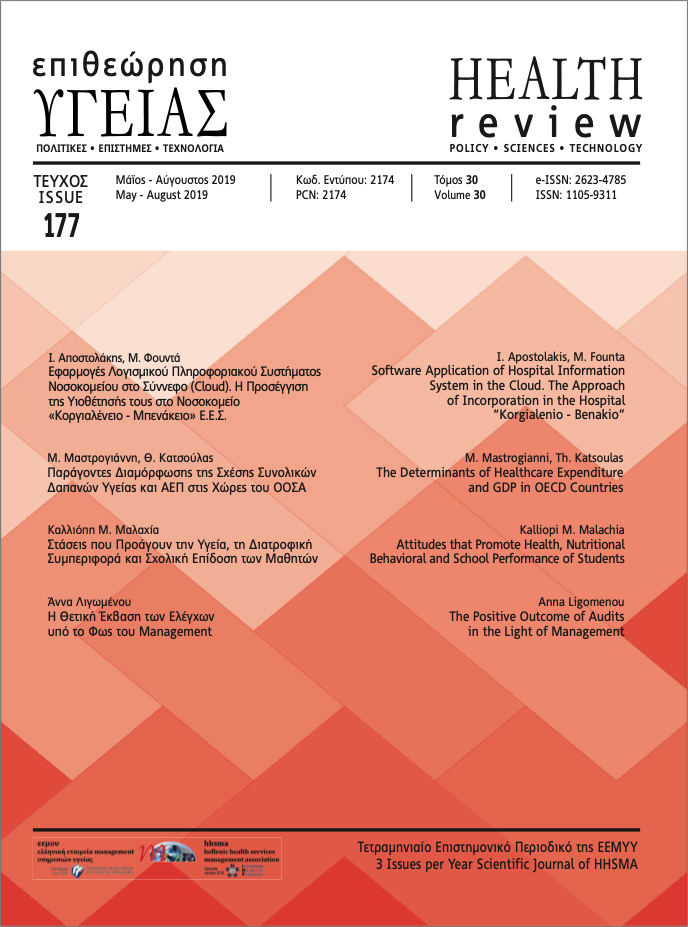
3 Issues per Year Scientific Journal of HHSMA
Editor in Chief: Georgia Oikonomopoulou MSc, PhD(c), Board Member of HHSMA, Board Member of EAHM
Latest Published Articles
The aim of this project is to study software applications of cloud Hospital Information Systems. In an effort to cover the ever-growing need for computing resources, combined with the need to achieve economies of scale, cloud computing technologies can contribute to the creation of cloud computing infrastructure. In addition, the integration of fragmented medical information and access when needed, leads to the need for upgrading and evolving Hospital Information Systems using cloud computing technology. The main concern of this project is to emerge the benefits that will arise for healthcare professionals and citizens who are the final recipients of health e-services. The existing information systems of the Hospital “Korgialenio – Benakio” are presented and the problems on data security, availability of electronic services and the cost of supply and maintenance of electronic infrastructures are identified. Next, an approach to adopt cloud computing technology from these information systems is made through a specific operational action plan. The material of the study was the Greek and international literature, as well as the data being kept in the Informatics and Organization Department of the Hospital “Korgialenio – Benakio”. According to the results, cloud computing incorporates technologies that promises to drastically reduce the cost of operating and maintaining hardware and soft- ware, bringing economic and business benefits to the health sector. Data security and confidentiality issues concerns users, who seem reluctant to fully accept these new technologies. However, cloud computing service providers are constantly trying to confront security uncertainties and challenges in an attempt to make cloud computing the most secure operation platform of information infrastructures.
Health spending has increased worldwide over the last decade and governments have seen this increase as unjustifiable and harmful both for the sustainability of health systems and for the financial system. This paper reviews the determinants of the relationship between total healthcare expenditure and GDP and the degree of impact of each determinant on the determination of total expenditure in health area in the countries of OECD. A systematic review of papers published up until July 2018 was conducted. Search was performed on PubMed, Medline, Scopus, ScienceDirect and OECD data. The criteria for papers' inclusion in this review were the demonstration of clear correlation between the determinants and healthcare expenditures. According the results, only 30 of the retrieved scientific papers met the inclusion criteria, whereas 10 of them assessed the impact of correlation between GDP per capita and healthcare expenditures, 7 examined how ageing influence the healthcare expenditures, 4 showed how “proximity to death” react to healthcare costs and, finally, 9 studies showed how the technological growth leads to more healthcare expenditure. In conclusion, GDP per capita is the leader determinant of healthcare expenditure. The determinants that follow are in line: ageing, technological change and proximity to death.
Objectives: The subject of this cohort study is the investigation of nutrition attitudes and perceptions of 225 children (97 boys, 128 girls), 11 years-old from fifth grade of the 12 Kos Primary schools, using questionnaires related to everyday life eating habits of their own, the level of physical activity, body image and the stress they experience every day. Results: The average rating of the students’ evaluation survey was 4.02, which reveals a high school performance. The assessment was made by the teacher of each class at a scale (Likert) from 1-5. From the summation of the answers about the attachment on Mediterranean Diet (KIDMED), the KIDMED score was 8.9 (ranging from 0 to 12), but recorded the children's negative tendency to regularly eat nuts and fish. Using the psychometric tool of self-esteem - PATEM II (answers that rated from 1 to 4, with higher values reflecting higher levels self-perception and self-esteem), it turned out that the studied children had a very good level of self-esteem. In addition, in the Predictive Anxiety Questionnaire, with STAIC Atrait score=48.2 (total value ranging from 20 to 60), it was found that the studied children did not react with tension in difficult situations. Conclusions - Implications: The only statistically significant differences that have emerged, relate to correlation of the father's origin with pupils' school performance (p
The implementation of the key management functions (planning, organization, management, control, decision making) modernizes and improves the Auditory Science, helping to achieve audit objectives, minimizing resources wastage and overcoming potential obstacles. The audit methodology must continually evolve and assess its unstable political, socio-economic, technical, legal, cultural and administrative environment, as well as the particularities of the audited entities. In the framework of the School of Behavioral Approach, in which the appropriate person has to be employed in the work for which he/she has the necessary qualifications, the auditors, the main human factor in conducting the audits, should be distinguished, among other things, for their integrity, objectivity, confidentiality and fairness. The auditing coordinator assumes the role of manager and ensures the unity of the audit process and the achievement of audit objectives.
